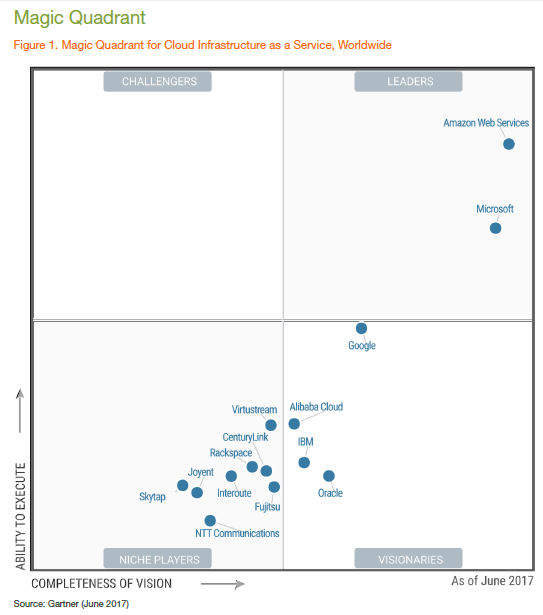
The Pentagon’s “Project Jedi” continues to make headlines this week as Microsoft employees published a letter asking the company to not bid on the work.
Jeff Bezos was interviewed the week and pondered why technology companies would decline an opportunity to work with the military as the “United States has a right to be defended”.
IBM was down 6% this week as cloud and analytics sales were flat. They did score a $240M AI contract with Lenovo, so it isn’t all bad?
Acquisitions
- Twilio acquires email API platform SendGrid for $2 billion in stock
Twilio, the ubiquitous communications platform, today announced its plan to acquire the API-centric email platform SendGrid for about $2 billion in an all-stock transaction. That’s Twilio’s largest acquisition to date, but also one that makes a lot of sense given that both companies aim to make building communications platforms easier for developers.
Artificial Intelligence
- IBM Snags $240 Million AI Deal
Lenovo is now looking to make its commercial PC business more efficient, and it’s turning to IBM’s artificial intelligence technology for help. IBM announced a multiyear deal with Lenovo on Thursday that aims to use AI to reduce customer service and field service costs. The $240 million pact, covering North America, Europe, the Middle East, Africa, and Latin America, is a win for IBM’s technology support services business.
https://www.fool.com/investing/2018/10/18/ibm-snags-240-million-ai-deal.aspx

Cloud
- Jeff Bezos Says Tech Companies Should Work With the Pentagon
The Amazon founder seemed baffled by the wave of employee dissent that has torn through tech companies over the ethical implications of government contracts. Last week, for example, Google said it would not bid for a Pentagon cloud computing contract called Joint Enterprise Defense Initiative, or JEDI. Google earlier said it would not renew its contract on Project Maven.
“It doesn’t make any sense to me,” Bezos said of tech companies pulling back from government work. “One of the jobs of the senior leadership team is to make the right decision, even when it’s unpopular.”
https://www.wired.com/story/amazons-jeff-bezos-says-tech-companies-should-work-with-the-pentagon/
- Microsoft workers urge company to pass on JEDI
“Many Microsoft employees don’t believe that what we build should be used for waging war,” the group said in an open letter published Oct. 12 on Medium. The post came as the company itself signaled in a blog post that it was likely to bid on the Joint Enterprise Defense Infrastructure contract, a 10-year, single-source deal designed to provide cloud and advanced computing capabilities to the warfighter in the field.
The Microsoft employee group is also seeking a set of “AI principles” modeled on the tenets of artificial intelligence put out by Google under pressure from its employees. Google has committed to not developing weaponized AI, as well as AI applications that conduct surveillance outside of “internationally accepted norms” and whose purpose “contravenes widely accepted principles of international law and human rights.”
https://fcw.com/articles/2018/10/15/jedi-microsoft-dont-bid.aspx
Security
- Apple, Google, Microsoft, and Mozilla come together to end TLS 1.0
The impact of removing the old protocols shouldn’t be too substantial. All four companies cite usage figures for the old versions; Firefox sees the most TLS 1.0 and 1.1 usage (1.4 percent of all secure connections) while the other three vendors claim a figure below 1.0 percent. The current recommendation is that sites switch to TLS 1.2 (which happens to be the minimum required for HTTP 2.0) and offer only a limited, modern set of encryption algorithms and authentication schemes. TLS 1.3 was recently finalized, but it currently has little widespread adoption.
- Apple ‘Deeply Apologetic’ Over Account Hacks in China
The Cupertino, Calif.-based company didn’t specify how many users were hit or how much money was stolen, nor did it offer details about how the hackers acquired the users’ Apple IDs and passwords. To help prevent unauthorized access to their accounts, Apple said, people should enable two-factor authentication.
Software/SaaS
- Why IBM’s Brief Growth Streak Just Stalled
There had been some faint lights at the end of the tunnel here over the past couple of quarters, when they’ve been able to grow their quarterly revenues. That flipped this quarter. Their strategic imperatives, which is really their cloud business, their data analytics business, saw some stumbling blocks. Their growth slowed there. They saw a drop in new signings in that business. That stung a little bit. It’s been a very tough go for IBM. Their best business this quarter, and really a lot this year, is their legacy mainframe business. That will tend to tail off next year.
https://www.fool.com/investing/2018/10/19/why-ibms-brief-growth-streak-just-stalled.aspx
Datacenter/Hardware
- Inside the heart of an IBM Cloud Data Center
Uh… Cool? - Dell says its gaming business is worth $3 billion
According to Frank Azor (who helms the Alienware, Gaming, and XPS divisions at Dell), that number puts Dell’s gaming business at three times the size of its competitors, though Azor apparently didn’t specify which competitors he was referring to. Also unknown is how that number breaks down between the flagship Alienware line and Dell’s more recent, cheaper G Series gaming hardware. It’d be interesting to see how the company’s newer and more budget-friendly options contribute to the overall total.
https://www.theverge.com/2018/10/18/17994618/dell-gaming-worth-3-billion-alienware

Other
- Google’s CEO Defends Potential Return to China
In his most extensive public remarks on the topic, Sundar Pichai said entering China in some ways aligns with the company’s mission to provide information to the world’s population, since one-fifth of those people reside in China. Even complying with China’s censors, he said, Google would be able to deliver search results to more than 99% of queries and in some cases deliver more helpful results than users currently get from local search engines.
https://www.wsj.com/articles/googles-ceo-defends-potential-return-to-china-1539661027
- Google could finally face serious competition for Android
Until now, Google has locked phone and tablet makers into its ecosystem. If they wanted to include Google’s apps and services at all, they effectively had to include those apps and services on every consumer Android device that they made (with the exception of inside China, where Google doesn’t operate). That’s meant, for instance, that Samsung likely couldn’t release a variant of the Galaxy S9 that only includes the Galaxy Apps store and the Samsung browser and doesn’t include Chrome, Google Play, or Google search.
Google said it is incorrect to say the original terms banned Android partners from making any phones or tablets without its apps. The terms only prevented them from selling non-certified versions of Android, the company says; devices that were “compatible” with its apps could still be shipped, even if its apps weren’t included. But it’s unclear whether there are any certified consumer Android devices that do not include Google’s apps.
- Netflix criticizes EU over ‘content quota’
The EU, writes Netflix CEO Reed Hastings in the report, is “currently rewriting its audio visual rules” that will demand streaming services like Netflix “devote a minimum of 30 percent of their catalog to European works.” Netflix’s report acknowledged that catering to a specific audience encouraged more regional original programming for international audiences, but suggested that enforcing quotas on a streaming service could have unwanted negative effects.
Photo by Tobias Cornille on Unsplash














